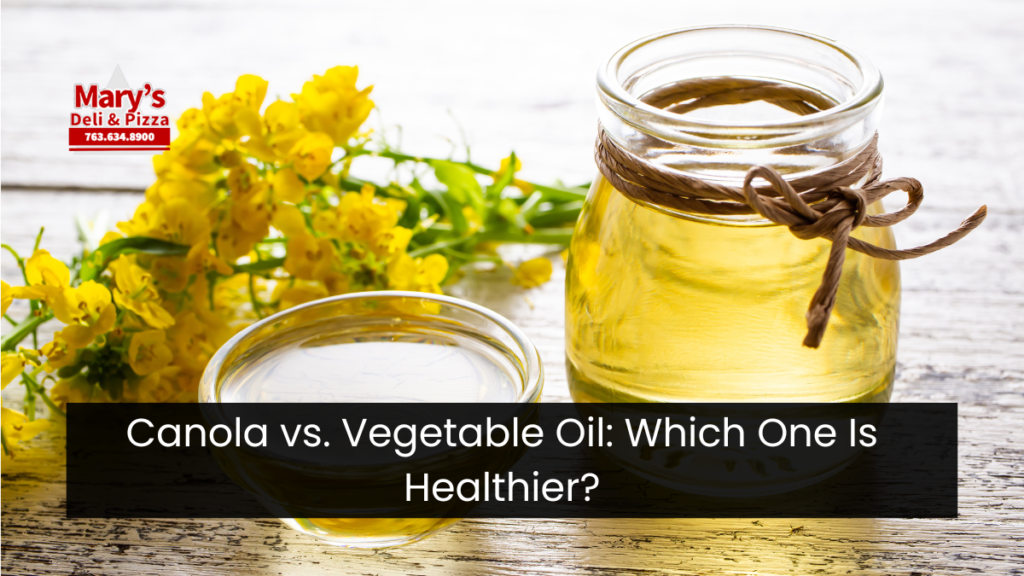When it comes to cooking, choosing the right oil can make all the difference. Whether you’re baking, roasting, or frying, both canola and vegetable oil are common kitchen staples, often used interchangeably. However, there are notable differences between the two, particularly in terms of health benefits, nutrition, and how they’re used. So, in the debate between canola vs. vegetable oil, which one takes the top spot?
In this article, we’ll break down the key differences between canola and vegetable oil, discuss their nutritional content, health benefits, and potential risks, and help you determine which is the best choice for your culinary needs.
Understanding How Canola And Vegetable Oil Are Made
The first major distinction between canola and vegetable oil is where they come from and how they are produced. Both oils undergo processes that affect their composition and nutritional properties.
Canola Oil Production
Canola oil is derived from the seeds of the canola plant. The oil is extracted by pressing these seeds, a process that can involve heat and chemical solvents. However, there is also a cold-pressed version, which does not involve heat and may retain more nutrients.
Canola oil was originally developed from rapeseed but was bred to contain lower levels of erucic acid to make it more suitable for human consumption. It’s known for being a heart-healthy oil due to its low saturated fat content and high levels of monounsaturated fats.
Vegetable Oil Production
Vegetable oil, on the other hand, is more of a blanket term and can come from a variety of plants, though it’s often derived from soybeans. Other oils such as sunflower, corn, or safflower oil may also fall under this label. Just like canola oil, vegetable oil goes through a refining process that involves heat, chemical solvents, and further filtration to remove impurities and stabilize the oil for longer shelf life.
Nutritional Comparison: Canola vs. Vegetable Oil
Both oils are similar in terms of calorie count, but there are significant differences in their fatty acid profiles and nutritional content.
| Nutrient (per 1 tbsp) | Canola Oil | Vegetable Oil (Soybean) |
|---|---|---|
| Calories | 124 | 120 |
| Total Fat | 14 g | 13.5 g |
| Saturated Fat | 1 g | 2 g |
| Monounsaturated Fat | 9 g | 3 g |
| Polyunsaturated Fat | 4 g | 8 g |
Canola Oil: A Heart-Healthy Choice
Canola oil shines when it comes to heart health due to its high content of monounsaturated fats. These fats help reduce bad LDL cholesterol and increase good HDL cholesterol, which is essential for cardiovascular health. Additionally, canola oil contains omega-3 fatty acids, which are known to fight inflammation and support heart function.
Another notable benefit of canola oil is its vitamin E content. One tablespoon provides about 16% of your daily vitamin E needs, which acts as an antioxidant to protect your cells from oxidative damage.
Vegetable Oil: Rich In Polyunsaturated Fats
Vegetable oil, particularly soybean oil, is rich in polyunsaturated fats, including both omega-6 and omega-3 fatty acids. While omega-6 fats have been viewed as potentially inflammatory, more recent research suggests that they can play a beneficial role in reducing cholesterol levels when used in moderation and as part of a balanced diet.
Vegetable oil is also an excellent source of vitamin K, providing 21% of your daily value in just one tablespoon. This vitamin is crucial for bone health and blood clotting, making it a valuable addition to a heart-healthy diet.
Health Benefits Of Canola And Vegetable Oil
Both oils offer unique benefits, but understanding the finer details can help you make an informed choice based on your nutritional goals.
Benefits Of Canola Oil
- High in Monounsaturated Fats: Canola oil is primarily composed of monounsaturated fats, which help promote heart health.
- Rich in Omega-3s: It contains small amounts of alpha-linolenic acid (ALA), a plant-based omega-3 fatty acid.
- Vitamin E Content: Provides antioxidant benefits and protects the body from oxidative stress.
- Low in Saturated Fat: With only 1 gram of saturated fat per tablespoon, it’s considered a heart-healthy option.
Benefits Of Vegetable Oil
- Rich in Omega-6s: Contains higher levels of polyunsaturated fats, which help reduce bad cholesterol.
- Good Source of Vitamin K: Essential for blood clotting and bone health.
- Versatile in Cooking: Its neutral flavor makes it a go-to oil for frying, roasting, and baking.
Potential Health Risks And Considerations
Though both canola and vegetable oils can be beneficial when used in moderation, there are a few potential concerns to keep in mind.
Canola Oil Risks
While canola oil is a better option for heart health, it’s still a refined oil, and consuming too much of it can contribute to weight gain due to its high-calorie content. Additionally, some studies have raised concerns about the long-term effects of regularly consuming highly refined oils, though more research is needed in this area.
Vegetable Oil Risks
Vegetable oil is often criticized for its higher content of omega-6 fatty acids. While these fats aren’t inherently bad, an imbalance between omega-6 and omega-3 intake could contribute to inflammation if not moderated. It’s important to maintain a balance by consuming more omega-3-rich foods, such as fish and flaxseed.
Taste And Cooking Properties
Both oils have a neutral flavor, making them suitable for a wide range of cooking methods. However, they differ slightly in their cooking properties.
Canola Oil In Cooking
With its high smoke point of about 400°F, canola oil is ideal for high-heat cooking methods like frying and roasting. Its neutral taste allows it to blend well with other flavors, making it a popular choice for baking and salad dressings.
Vegetable Oil In Cooking
Vegetable oil also has a neutral taste, making it a versatile choice for both sweet and savory dishes. It has a slightly lower smoke point of about 400°F, but it’s still suitable for deep frying and sautéing.
Canola vs. Vegetable Oil: Which One Is Healthier?
When comparing the two, canola oil stands out slightly due to its higher omega-3 content, lower saturated fat levels, and beneficial amounts of vitamin E. However, vegetable oil still offers heart-healthy benefits with its polyunsaturated fats and vitamin K, making it a viable choice as well.
Ultimately, both oils can be part of a healthy diet when used in moderation. If you’re looking to reduce inflammation and support heart health, canola oil may have the edge. However, for bone health and cholesterol management, vegetable oil might be your best bet.
Conclusion:
Both canola oil and vegetable oil offer distinct health benefits when used in moderation. Canola oil is high in omega-3 fatty acids and vitamin E, making it a better choice for managing inflammation and promoting heart health.
On the other hand, vegetable oil, typically made from soybeans, provides vitamin K and plant sterols, which can support bone health and help reduce cholesterol levels. Ultimately, the healthier choice depends on your nutritional goals, and both oils can fit into a balanced diet when used wisely.
FAQs
1. Is Canola Oil Healthier Than Vegetable Oil?
Yes, canola oil is considered slightly healthier due to its higher levels of omega-3 fatty acids and vitamin E, which support heart health and reduce inflammation.
2. Can I Use Vegetable Oil Instead Of Canola Oil In Recipes?
Yes, both oils have a neutral flavor and similar cooking properties, making them interchangeable in most recipes.
3. Which Oil Is Better For Heart Health?
Canola oil is better for heart health due to its lower saturated fat content and higher monounsaturated fats, which help reduce bad cholesterol levels.
4. Does Canola Oil Contain Omega-3?
Yes, canola oil contains a small amount of omega-3 fatty acids, specifically alpha-linolenic acid (ALA), which is beneficial for heart health.
5. Is Vegetable Oil Bad For You?
Vegetable oil isn’t bad when consumed in moderation, but it’s important to balance it with omega-3-rich foods to avoid an imbalance in fatty acids.






